Are you curious about Japanese names? In Japan, names are more than just a way to call someone. They tell a story, share a feeling, or connect to nature. Today, we’re looking at 125 Japanese names that have something to do with “blood.” These names are special because they touch on ideas of life, strength, and family ties. Whether you’re picking a name for a new baby, writing a story, or just interested in the meaning behind names, you’ll find something interesting here. Let’s dive into these names and find out what makes them so meaningful.
Exploring Japanese Names Meaning Blood
Boys Names That Mean Blood
When we look at Japanese boys’ names related to blood, we see how they connect to their cultural roots and what they stand for. Take Chihiro, for example. This name means a deep journey, which shows how much value is placed on personal growth and bravery in Japanese culture.
- Chinomu (血夢) – “Blood dream,” suggesting a deep, vivid dream tinged with passion or fate deeply connected to life’s vital force.
- Keishun (血春) – “Blood of spring,” evoking the renewal and vital energy that spring brings, symbolizing the life force within blood.
- Ketsueki (血液) – Literally “blood,” representing life, vitality, and essence.
- Chinoji (血路) – “Blood path,” signifying a life journey deeply connected to one’s roots and vital essence.
- Chiaki (千秋) – “Thousand autumns,” metaphorically meaning enduring as blood does through generations.
- Sangui (桟義) – “Pillar of blood,” symbolizing a strong foundational life force.
- Chihiro (血広) – “Widespread blood,” implying a life that touches many, spreading influence and vitality.
- Ketsuron (血論) – “Theory of blood,” suggesting a deep philosophical understanding of life’s essence.
- Chikara (力) – “Power,” metaphorically connected to the power and vitality blood represents.
- Chishio (血潮) – “Current of blood,” reflecting the flowing life force and vitality.
- Chitose (千歳) – “Thousand years,” symbolizing longevity and the enduring nature of blood.
- Chiyu (血勇) – “Blood courage,” representing bravery that is as fundamental as blood.
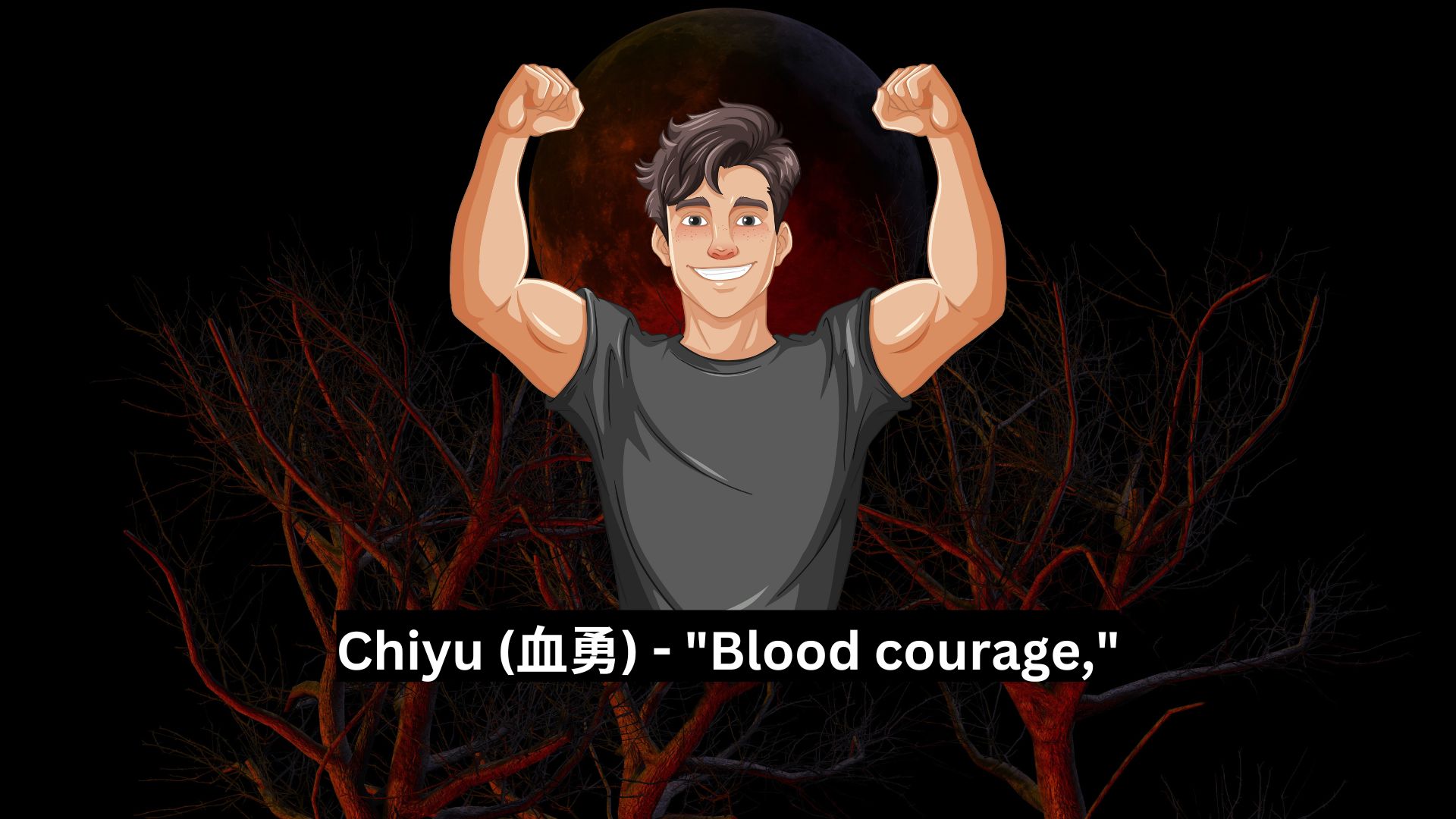
- Hemato (ヘマト) – “Blood,” a unique adaptation of the Greek root for blood, used in modern contexts.
- Akaji (赤血) – “Red blood,” emphasizing the vitality and life-giving quality of blood.
- Chigiri (血切) – “Blood oath,” symbolizing deep commitments and bonds as vital as blood.
- Chizen (血善) – “Good blood,” implying noble heritage or virtuous qualities inherent in one’s lineage.
- Ketsuron (血論) – “Discourse on blood,” suggesting deep studies or connections to life’s essence.
- Chimei (血命) – “Blood life,” representing the inseparable connection between life and blood.
- Chimichi (血道) – “Blood road,” indicating a life path deeply influenced by one’s vital essence.
- Chisoku (血息) – “Blood breath,” metaphorically meaning the essential life force that sustains us.
- Enkei (円血) – “Circular blood,” symbolizing the cyclical nature of life and inheritance.
- Ryūketsu (流血) – “Flowing blood,” emphasizing continuous life force and vitality.
- Seiketsu (清血) – “Pure blood,” suggesting clarity and purity in one’s life and actions.
- Tamashi (魂血) – “Soul blood,” representing the deep, spiritual connection of blood as the essence of life.
- Chikan (血感) – “Blood feeling,” a sense of deep emotional or instinctual connection.
- Chinami (血波) – “Blood wave,” symbolizing the powerful, undulating force of life.
- Ketsuba (血馬) – “Blood horse,” evoking the strength and vitality of a life force as powerful as a horse.
- Chiaki (血輝) – “Blood brilliance,” implying a life that shines brightly, powered by its vital essence.

- Chiyo (千代) – “A thousand generations,” emphasizing the enduring legacy carried through bloodlines.
- Shinchi (真血) – “True blood,” signifying authenticity and purity in one’s life essence.
- Ketsui (決意) – “Determination,” metaphorically linked to the resolve and life force represented by blood.
- Akachan (赤ちゃん) – “Red baby,” a term of endearment reflecting the innocence and essential vitality of life.
- Chimyaku (血脈) – “Blood vein,” representing the pathways through which life’s essence flows.
- Chisei (血性) – “Blood nature,” implying a personality or essence as fundamental as blood.
- Chishin (血心) – “Blood heart,” symbolizing the heart’s crucial role in sustaining life through blood.
- Kessho (血笑) – “Blood smile,” a metaphor for a life lived fully and with vitality.
- Chiyari (血槍) – “Blood spear,” evoking the strength and piercing clarity that blood can represent.
- Chimata (血又) – “Blood again,” suggesting the recurring, vital role of blood in life and renewal.
- Chirei (血霊) – “Blood spirit,” emphasizing the spiritual dimensions of blood as a life force.
- Chigaku (血学) – “Study of blood,” representing a deep, academic or philosophical engagement with life’s essence.
- Chitsuki (血月) – “Blood moon,” symbolizing rare, powerful events and their impact on life.

- Hemaji (へまじ) – A creative interpretation, meaning “blood path,” highlighting the journey of life driven by blood.
- Chigiri (血桐) – “Blood paulownia,” linking the tree used in traditional ceremonies to the vital, sustaining nature of blood.
- Chisai (血才) – “Blood talent,” emphasizing the innate abilities and life force one carries.
- Ketsuga (血画) – “Blood picture,” symbolizing a life depicted vividly and powerfully as if painted with blood.
You may also like our list of Japanese names that mean moon.
Girls Names That Mean Blood
Exploring Japanese girl names related to blood reveals deep cultural connections and personal meanings. Take Akane, which means deep red. It’s all about passion and energy, capturing the lively sides of life. Then there’s Akari, translating to a bright village, highlighting how vital blood is, like light sustaining a community. Each name isn’t just a label; it reflects deep cultural ties and the importance of blood in Japanese tradition.
- Chiyo (千代) – “Thousand generations,” representing the enduring nature of blood through lineage.
- Chiharu (血春) – “Blood spring,” suggesting renewal and vitality, like the rebirth that comes with spring.
- Akane (茜) – “Deep red,” a color closely associated with blood, symbolizing life and energy.
- Chisato (千里) – “Thousand miles,” metaphorically implying the journey of life sustained by blood.
- Ketsueki (血液) – Literally “blood,” denoting life, vitality, and essence.
- Chiaki (千秋) – “Thousand autumns,” representing the deep, rich colors of autumn, akin to the richness of blood.
- Chika (血花) – “Blood flower,” symbolizing beauty and life emerging from the vitality of blood.
- Chizuru (千鶴) – “Thousand cranes,” a bird often associated with good fortune and longevity, akin to the life-giving properties of blood.
- Chitose (千歳) – “Thousand years,” emphasizing the eternal flow of life and heritage carried through blood.
- Chiemi (血美) – “Blood beauty,” denoting the intrinsic, vital beauty of life’s essence.
- Hemiko (血子) – “Blood child,” symbolizing a life born from the essence and vitality of blood.
- Chimai (血舞) – “Blood dance,” suggesting a life lived with passion and vitality, like a spirited dance.
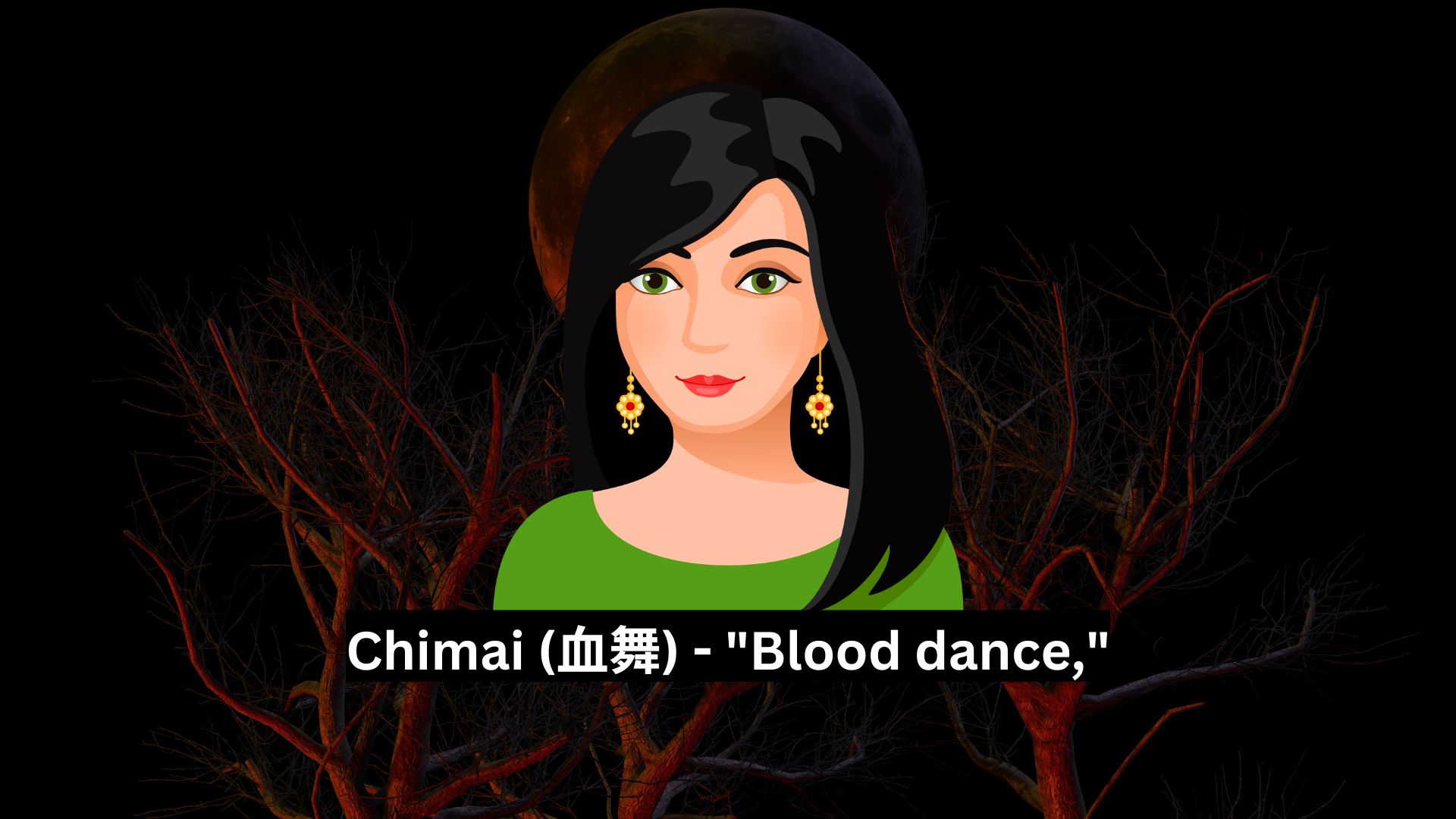
- Chirin (血輪) – “Blood wheel,” indicating the cycle of life and blood’s role in sustaining it.
- Sangria (桟利亜) – A unique adaptation from the Spanish drink, symbolizing the rich, vital life force of blood.
- Chinatsu (血夏) – “Blood summer,” evoking the warmth and vital energy of summer, reflecting the heat and power of blood.
- Chiyu (血由) – “Blood reason,” signifying the fundamental, life-giving reasons blood is essential.
- Ketsuno (血野) – “Blood field,” metaphorically representing fields nourished by the life force, as humans are by blood.
- Chihiro (千尋) – “A thousand explorations,” linked to the exploration of life powered by the vitality of blood.
- Chisae (千冴) – “Thousand clear,” indicating clarity and purity, attributes vital to life, like clean blood.
- Chimiko (血美子) – “Beautiful blood child,” emphasizing beauty and vitality inherent in life’s essence.
- Chikako (血香子) – “Blood fragrance child,” symbolizing the subtle yet vital presence of life’s blood.
- Ketsuki (血希) – “Rare blood,” suggesting uniqueness and preciousness, like rare blood types that are cherished.
- Chiyoko (千代子) – “Child of a thousand generations,” representing the passing of life’s essence through bloodlines.
- Chitomi (血富) – “Blood wealth,” implying richness and abundance in life’s essence.
- Akari (灯里) – “Red light,” metaphorically reflecting the glow and life-giving quality of blood.
- Chiyori (血依) – “Reliance on blood,” signifying dependence on blood as the source of life.

- Chinami (血波) – “Blood wave,” suggesting the powerful, undulating force of life and blood.
- Chiaya (千彩) – “Thousand colors,” reflecting the various qualities and vitalities that blood represents.
- Chinoko (血の子) – “Child of blood,” denoting a direct connection to life’s fundamental force.
- Chimura (血村) – “Blood village,” metaphorically representing a community sustained by shared life force.
- Chisumi (血澄) – “Clear blood,” symbolizing purity and clarity essential for life.
- Chirika (血理花) – “Blood logic flower,” combining beauty with the essential truths of life’s blood.
- Chikae (血加恵) – “Blood added grace,” signifying the grace and blessings carried through blood.
- Chiriko (血里子) – “Child of blood village,” emphasizing community and heritage linked by blood.
- Ketsumi (血美) – “Beautiful blood,” highlighting the intrinsic beauty and value of life’s essence.
- Akemi (明美) – “Bright and beautiful,” reflecting the life and brilliance associated with vibrant blood.
- Chiara (血良) – “Good blood,” indicating noble qualities and virtues carried through blood.
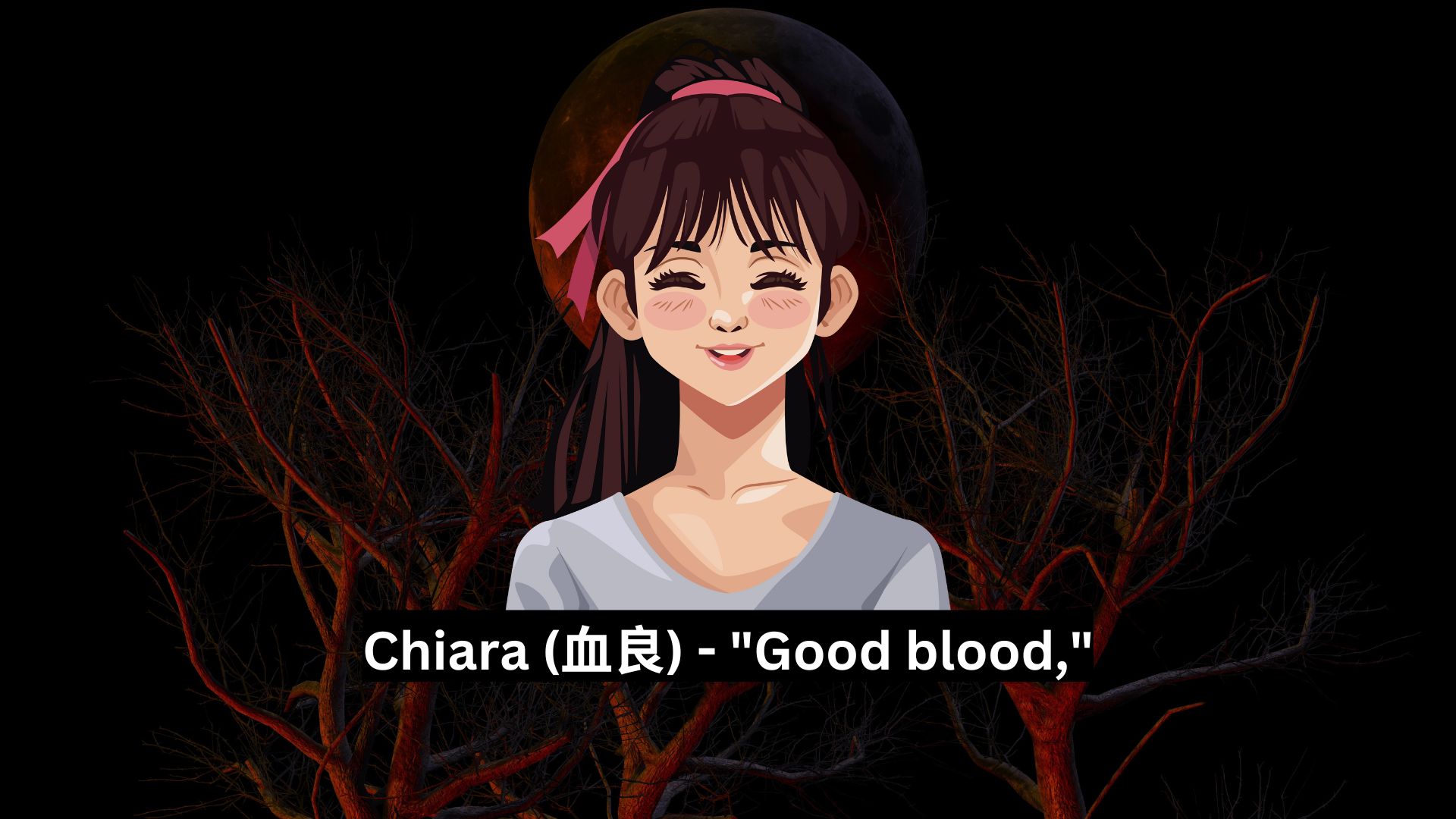
- Chiyu (千結) – “Thousand ties,” representing the bonds and connections formed through the sharing of life’s essence.
- Chigusa (千種) – “Thousand kinds,” denoting the diversity and complexity of life, akin to the various functions of blood.
- Chiaya (千綾) – “Thousand designs,” symbolizing the intricate, essential patterns of life like those created by blood.
- Chiisa (千紗) – “Thousand veils,” metaphorically speaking to the delicate yet vital layers of life sustained by blood.
- Chinori (血則) – “Blood rule,” indicating the guiding principles of life as dictated by the essence of blood.
- Chisato (千聡) – “Thousand wise,” linking wisdom and insight to the foundational life force of blood.
- Chiasa (千朝) – “Thousand mornings,” suggesting the renewal each day brings, like the revitalizing nature of blood.
You may also like our list of Japanese Names Meaning Fire.
Unisex Names That Mean Blood
Japanese unisex names often have deep meanings that touch on life, energy, and connection. Other names like Beni, which means ‘crimson,’ and Enji, meaning ‘flame ruler,’ show how the symbolism of blood goes beyond gender. These names connect with strong emotions and vitality.They represent life’s force and ongoing existence. When parents pick these names, they’re giving their kids a sense of strength and a deep connection to their family history and cultural background.
- Ketsueki (血液) – “Blood,” directly denoting life’s vital fluid, essential for vitality and survival.
- Chiaki (千秋) – “Thousand autumns,” metaphorically representing the continuous and vital flow of life, akin to blood.
- Chitose (千歳) – “Thousand years,” emphasizing the enduring and sustaining nature of blood through generations.
- Chiharu (千春) – “Thousand springs,” symbolizing rejuvenation and renewal, as blood rejuvenates the body.
- Chikara (力) – “Power,” metaphorically linked to the vital force and energy that blood represents in sustaining life.
- Chiyo (千代) – “A thousand generations,” illustrating the hereditary and timeless aspect of blood.
- Chisai (千才) – “Thousand talents,” suggesting the diverse and essential capabilities blood carries for life.
- Chinami (血波) – “Blood wave,” signifying the powerful, life-sustaining currents of blood.
- Chisato (千里) – “Thousand miles,” metaphorically indicating the long journey of life supported by the circulation of blood.
- Chiryo (治療) – “Treatment,” connected to blood through the concept of healing and medical care.
- Chikyu (地球) – “Earth,” suggesting the universal and foundational aspect of blood as a life force.
- Hemato (血) – A stylized form meaning “blood,” emphasizing its fundamental role in life and health.
- Chihiro (千尋) – “A thousand explorations,” linking to the journey of life and the exploration of one’s essence, like blood exploring through veins.
- Sangui (桟義) – “Blood duty,” emphasizing the essential responsibilities and roles that blood plays in life.
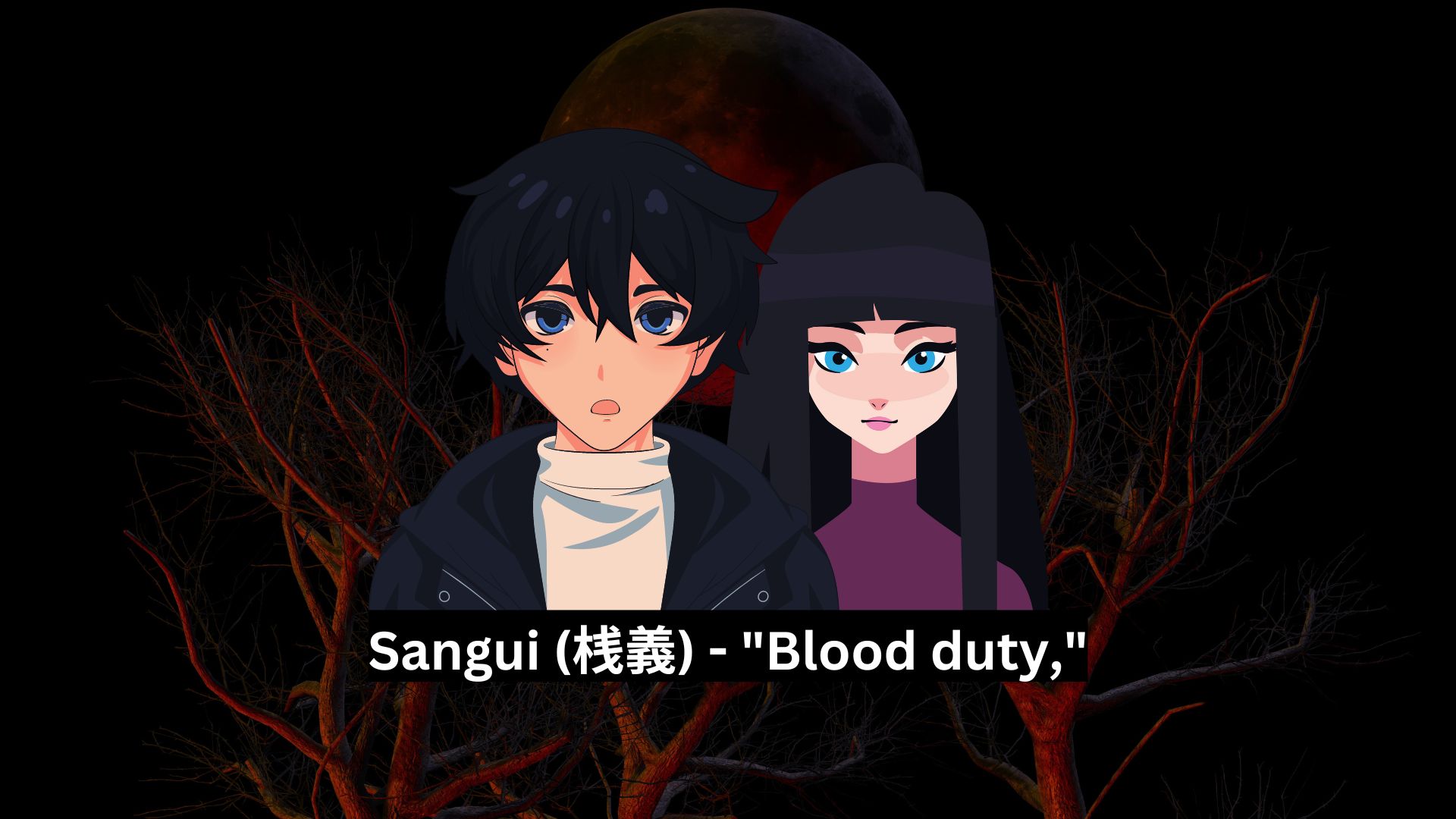
- Chikai (誓い) – “Oath,” metaphorically connected to blood through deep commitments and bonds, akin to blood oaths.
- Chizu (千洲) – “Thousand continents,” symbolizing the vast and essential spread of life, like blood throughout the body.
- Chiyu (治癒) – “Healing,” directly linked to the healing properties of blood.
- Chie (知恵) – “Wisdom,” suggesting the life experience and knowledge that flows through generations, like blood.
- Chimei (血命) – “Blood life,” representing the vital essence and life force carried in blood.
- Chirei (血霊) – “Blood spirit,” emphasizing the spiritual and vital essence carried in blood.
- Chirin (血輪) – “Blood wheel,” indicating the cyclical nature of life and blood’s role in sustaining it.
- Ketsuron (血論) – “Blood theory,” suggesting deep philosophical or scientific studies related to blood.
- Chiaki (血明) – “Blood bright,” linking brightness and clarity to the life-giving qualities of blood.
- Chiisa (千紗) – “Thousand veils,” metaphorically speaking to the complex and layered nature of life, as blood is to the body.
- Chikage (千影) – “Thousand shadows,” representing the profound and often unseen impact of blood on life.
- Chiyo (千世) – “A thousand worlds,” symbolizing the universal and all-encompassing nature of blood.
- Chiyari (血槍) – “Blood spear,” evoking the strength and piercing importance of blood in life and survival.
- Chigusa (千種) – “Thousand types,” denoting the diversity and complexity of life, akin to the various functions of blood.
- Chikuto (血琴) – “Blood harp,” suggesting the harmony and vital music blood plays in the symphony of life.
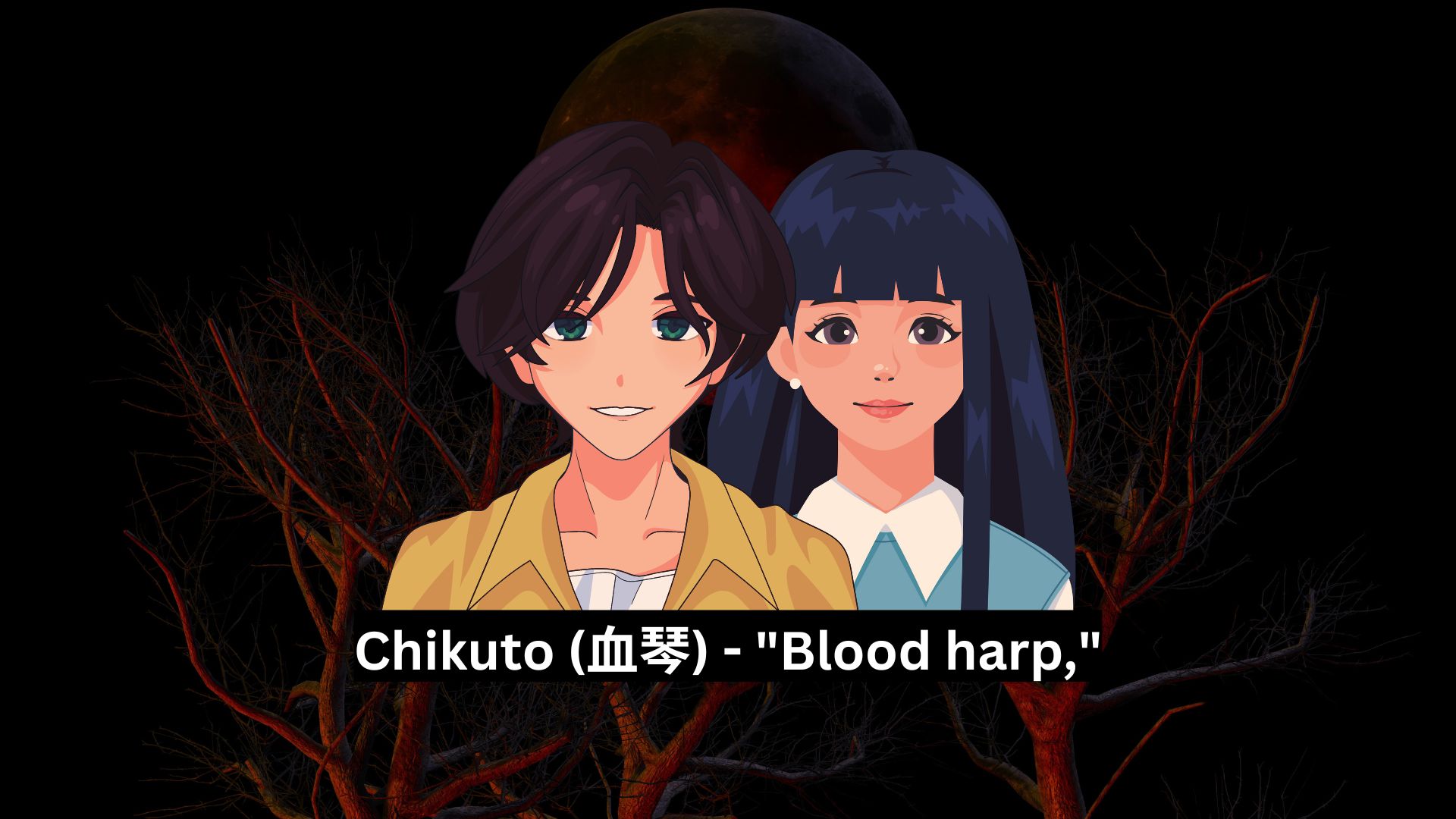
- Chisoku (血息) – “Blood breath,” metaphorically meaning the essential life force that sustains us, like breath.
- Chiura (血浦) – “Blood bay,” symbolizing a safe haven or vital reservoir, as blood is a reservoir of nutrients and oxygen.
- Chiyuba (血馬) – “Blood horse,” representing the strength and vitality of a life force as powerful as a horse.
- Chihiko (千火子) – “Thousand fires child,” connecting the fiery passion and energy blood brings to life.
- Chimiko (血水子) – “Blood water child,” emphasizing the essential fluid nature of blood as life’s water.
- Chikumo (血雲) – “Blood cloud,” symbolizing the omnipresent and essential nature of blood in life.
- Chitami (血民) – “Blood people,” representing the community and collective life force shared through blood.
- Chito (千斗) – “Thousand measures,” implying the quantifiable and crucial aspects of blood in medical and life contexts.
- Chikara (血柄) – “Blood pattern,” denoting the unique genetic and hereditary patterns carried in blood.
- Chiryu (血流) – “Blood flow,” highlighting the continuous movement and vital importance of circulating blood.
- Chisaki (千咲) – “Thousand blooms,” metaphorically representing the blossoming and flourishing of life sustained by blood.
- Chiyuto (血豊) – “Blood abundance,” emphasizing the richness and fullness of life that blood brings.
- Chiyo (千代) – “A thousand ages,” underscoring the ageless and eternal quality of blood as a cornerstone of life.
Last Names That Mean Blood
How do certain Japanese last names capture the importance of blood?
In Japanese culture, last names often have deep meanings that tell stories about family history, characteristics, or connections to nature. Another surname, Chishioya, meaning ‘blood tide valley,’ might point to a place known for important battles or represent the powerful, repeating forces of life, much like ocean tides that are driven by the moon, showing both life’s creation and destruction. These names use the image of blood to convey strong, meaningful ideas about family and history.
- Ketsuekiba (血液場) – “Blood field,” representing a place deeply connected to life and vitality.
- Chiryū (血流) – “Blood flow,” symbolizing a family lineage that is vital and ever-moving.
- Chigami (血紙) – “Blood paper,” metaphorically representing a family history written in blood.
- Chiishi (血石) – “Blood stone,” indicating a family foundation as solid and essential as blood.
- Chihiro (千尋) – “Thousand fathoms,” metaphorically deep like the profound nature of blood in life.
- Chikumo (血雲) – “Blood cloud,” symbolizing a family with a profound and pervasive influence.
- Chisato (血里) – “Blood village,” representing a family rooted in a nurturing community.
- Chizora (血空) – “Blood sky,” indicating a family with a vast and overarching presence.
- Chimori (血森) – “Blood forest,” symbolizing a family with deep, entwined roots and vitality.
- Chisuna (血砂) – “Blood sand,” metaphorically representing the countless, foundational particles of a family.
- Chimizu (血水) – “Blood water,” reflecting a family’s essential, life-giving nature.
- Chikaze (血風) – “Blood wind,” symbolizing the unseen yet vital influence of a family.
- Chiaki (血秋) – “Blood autumn,” indicating a family with a legacy as rich and vibrant as autumn.
- Chiyama (血山) – “Blood mountain,” representing a family’s towering strength and presence.
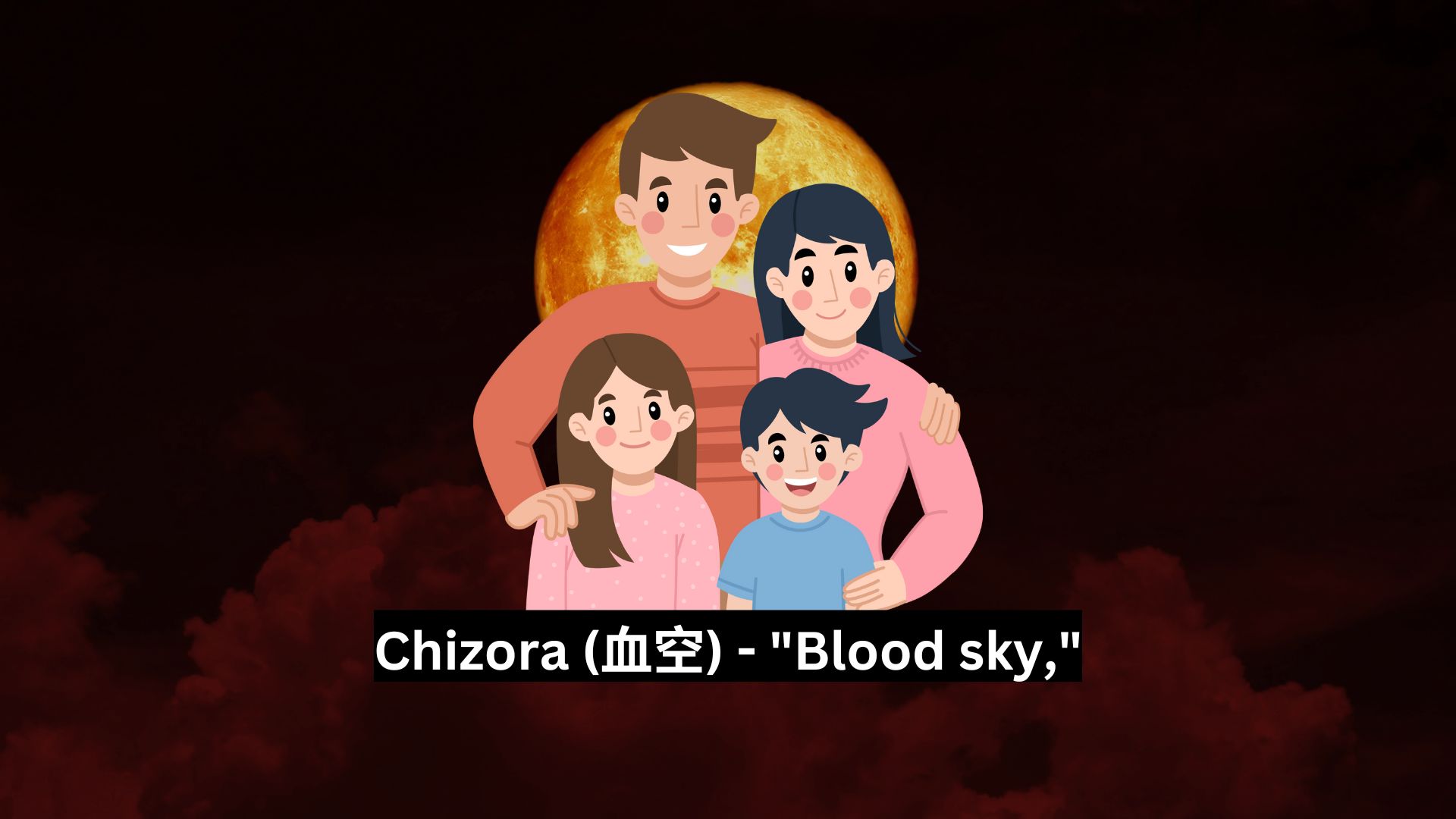
- Chihate (血畑) – “Blood field,” evoking a place of growth and sustenance, vital like blood.
- Chikage (血影) – “Blood shadow,” symbolizing a subtle yet profound family influence.
- Chikawa (血川) – “Blood river,” representing a family’s continuous and life-sustaining flow.
- Chihama (血浜) – “Blood beach,” metaphorically highlighting a family’s boundary between land and sea, life and death.
- Chisugi (血杉) – “Blood cedar,” indicating a family known for its enduring and resilient nature.
- Chitaki (血滝) – “Blood waterfall,” symbolizing a family’s powerful and cascading influence.
- Chibana (血花) – “Blood flower,” representing a family that blooms vividly and vitally.
- Chimine (血峰) – “Blood peak,” indicating a family’s pinnacle of achievement or prominence.
- Chitani (血谷) – “Blood valley,” symbolizing a family nestled in a protective and fertile environment.
- Chiura (血浦) – “Blood bay,” indicating a family’s safe harbor and nurturing environment.
- Chiyari (血槍) – “Blood spear,” representing a family known for its strength and protection.
- Chikyo (血響) – “Blood echo,” symbolizing a family whose influence reverberates through time.
- Chimura (血村) – “Blood village,” reflecting a family deeply integrated into community life.
- Chisumi (血澄) – “Clear blood,” representing a family known for purity and clarity.
- Chisoko (血底) – “Blood bottom,” metaphorically indicating the deep, foundational nature of the family.
- Chitoge (血峠) – “Blood pass,” symbolizing a family located at a crucial crossing or threshold.
- Chisaki (血崎) – “Blood cape,” representing a family that stands out prominently like a cape along a coastline.
- Chiike (血池) – “Blood pond,” reflecting a family’s deep, contained strength.
- Chihodo (血道) – “Blood road,” indicating a family path that is vital and life-sustaining.
- Chitomo (血友) – “Blood friend,” symbolizing a family known for its deep bonds and loyalties.
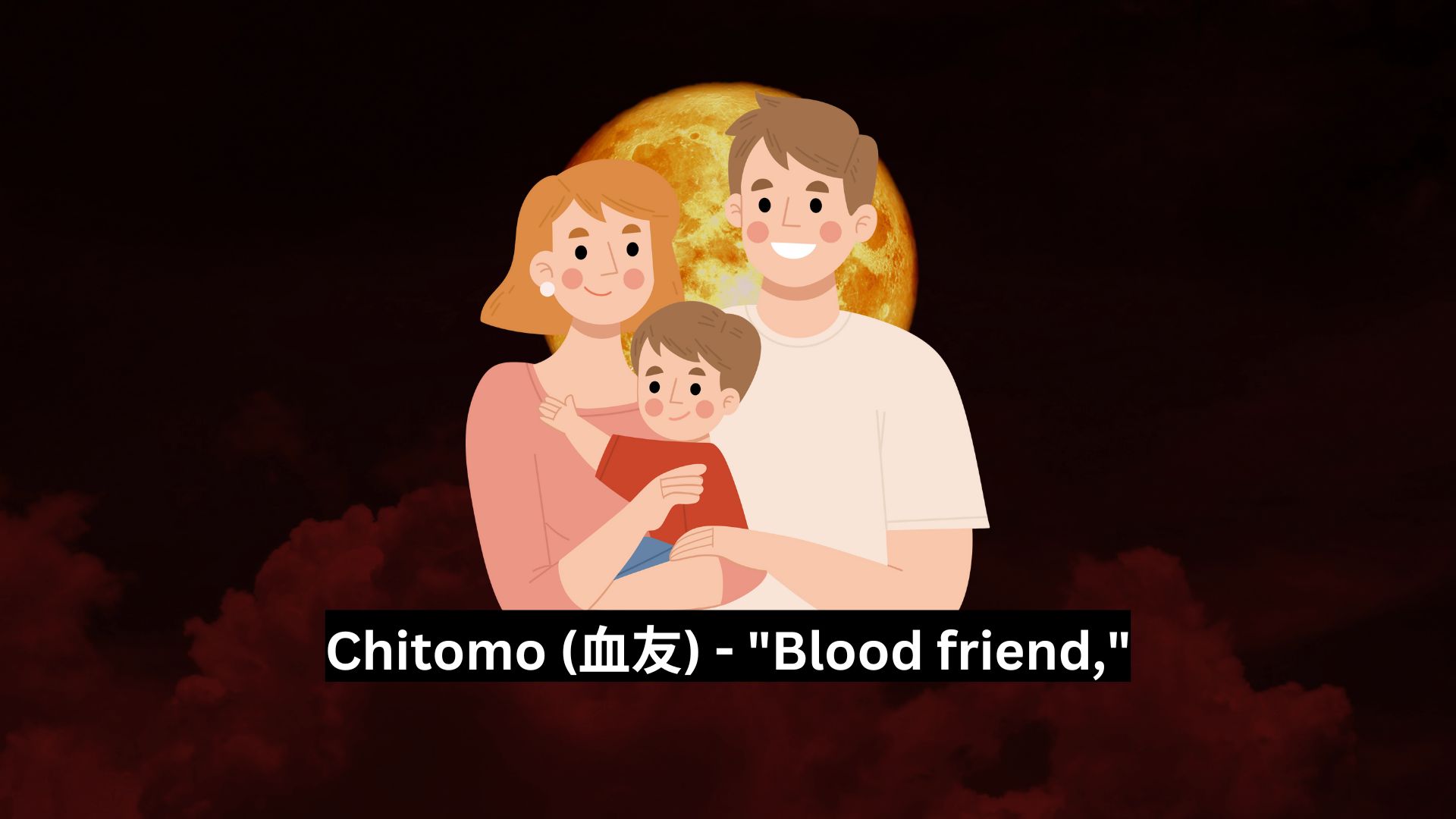
- Chiyasu (血安) – “Blood peace,” representing a family that brings stability and harmony.
- Chimado (血窓) – “Blood window,” symbolizing a family that offers insight and transparency.
- Chiseki (血石) – “Blood rock,” reflecting a family’s unshakeable strength and foundation.
- Chinori (血則) – “Blood rule,” indicating a family known for its guiding principles or laws.
- Chigiri (血桐) – “Blood paulownia,” a tree used in ceremonies, representing a family’s ceremonial importance.
- Chiseto (血瀬戸) – “Blood strait,” symbolizing a family that navigates crucial passages or transitions.
- Chinaka (血中) – “Blood center,” reflecting a family at the heart of its community or field.
- Chiura (血浦) – “Blood inlet,” representing a family that provides shelter and sustenance.
- Chikata (血方) – “Blood direction,” indicating a family that leads or guides.
- Chisai (血西) – “Blood west,” symbolizing a family that faces challenges or looks towards new horizons.
- Chimaki (血巻) – “Blood scroll,” representing a family with a rich, storied history akin to a detailed scroll.
Also check – 120 Japanese Names That Mean Butterfly (For Boys & Girls).
Blood Symbolism in Japanese Culture
In Japanese culture, blood is more than just a biological necessity—it’s a powerful symbol. It represents both life and family heritage. Blood was especially significant during the samurai era. Samurai used it to show loyalty and honor, often sealing their promises with blood to prove their dedication to their lords.
Blood also plays a big role in myths. It’s tied to stories about the beginning of the world and the gods who started it all, highlighting its sacred importance. Bloodlines are key in determining family heritage, showing that blood connects different generations.
This deep respect for blood appears in many Japanese cultural practices, rituals, and art. It’s a central theme that touches on everything from personal identity to historical legacy.
Conclusion
To sum it up, looking into 125 Japanese names related to blood shows us their deep cultural importance. These names carry meanings linked to life, ancestry, and honor, showing how much respect there is for blood as a symbol in Japanese culture. Exploring these names helps us get a better grasp of language details and gives us a deeper appreciation for how Japanese history and emotions are woven into their words. Each name tells its own story, deepening our understanding and appreciation of Japanese cultural heritage and the powerful meanings behind names.
Don’t forget to bookmark our site The Jeep Diva for more such interesting articles on list of names.

Sara Sabrena is an experienced content writer and a passionate movie fan. She loves analyzing movies and writes engaging reviews and in-depth analyses of films, from independent ones to big blockbusters. With her background in literature and media studies, Sara adds depth and her own unique viewpoint to her writing.

